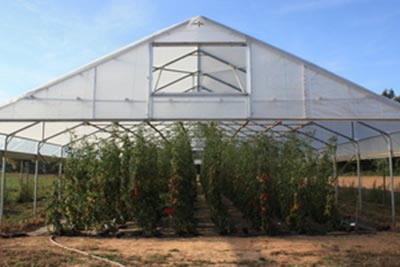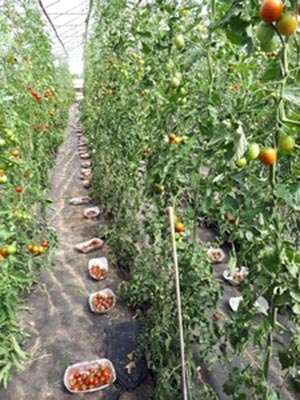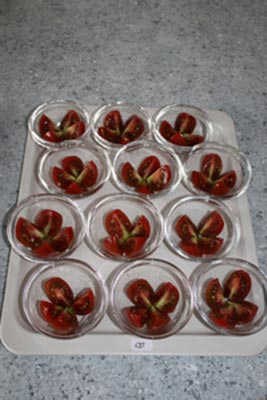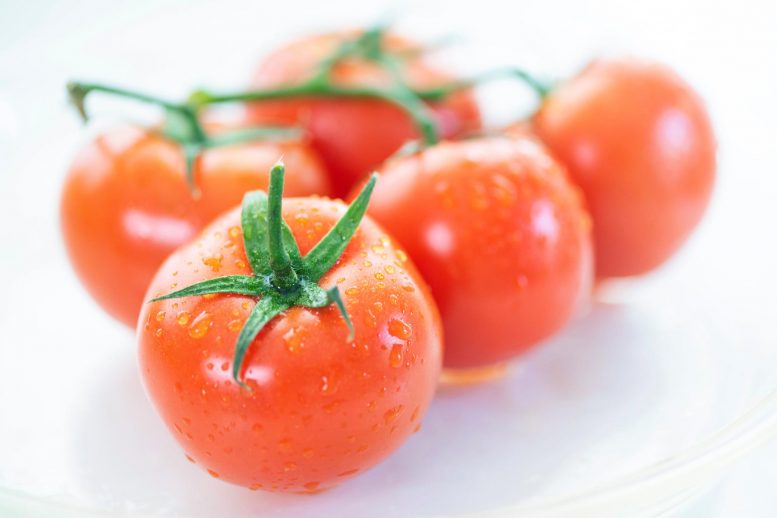Research team from the University of Göttingen investigates the influence of storage on the flavor of ripe tomatoes.

There is a lot of debate about the correct storage of tomatoes. Credit: Division of Quality of Plant Products, University of Göttingen
There is much debate about the correct storage of tomatoes. There are two main options available to consumers: storage in the refrigerator or at room temperature.
A research team from the University of Göttingen has now investigated whether there are differences in the flavor of ripe tomatoes depending on how they are stored and taking into account the chain of harvesting from farm to fork. No perceptible difference was found: the variety of tomatoes is much more important. The results were published in the journal Frontiers in Plant Science on May 13, 2020.

If we want to know about flavor, the variety of tomatoes is the most important consideration. Credit: Division of Quality of Plant Products, University of Göttingen
How does the flavor change when ripe, picked tomatoes go through a commercial post-harvest chain and are then stored either in the refrigerator (7 degrees Celsius or 45 degrees Fahrenheit) or at room temperature (20 degrees Celsius or 68 degrees Fahrenheit)?
Researchers from the Division of Quality of Plant Products at the University of Göttingen analyzed flavor-related attributes in new tomato strains drawing on the expertise of a “sensory panel.” The sensory panel consisted of experienced and trained assessors who use their senses to perceive and evaluate the sensory properties of products.
Among other attributes, this panel examined the discernible sweetness, acidity, and juiciness of tomatoes. No significant differences in flavor were found between the two storage options when the entire post-harvest chain is taken into account.

Keep your tomatoes in the fridge or in the fruit bowl? The expert panel didn’t find a huge difference in flavor. Credit: Division of Quality of Plant Products, University of Göttingen
“It is the variety of tomato in particular that has an important influence on the flavor. Therefore, the development of new varieties with an appealing flavor can be a step towards improving the flavor quality of tomatoes,” says Larissa Kanski, lead author of the study.
“The shorter the storage period, the better it is for the flavor and related attributes. However, we were able to show that, taking into account the entire post-harvest chain, short-term storage of ripe tomatoes in the refrigerator did not affect the flavor,” reports Head of Division Professor Elke Pawelzik.
Reference: “Flavor-Related Quality Attributes of Ripe Tomatoes Are Not Significantly Affected Under Two Common Household Conditions” by Larissa Kanski, Marcel Naumann and Elke Pawelzik, 13 May 2020, Frontiers in Plant Science.
DOI: 10.3389/fpls.2020.00472
The study is part of the PETRAq+n – project (Partizipative Entwicklung von QualitätsTomaten für den nachhaltigen regionalen Anbau), which is financially supported by the Ministry for Science and Culture of Lower Saxony (VWZN3255).










Be the first to comment on "Should Ripe Tomatoes Go in the Fridge? Scientific Testing Seeks to Resolve the Debate"